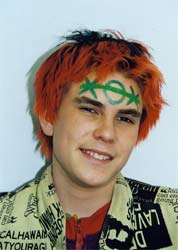 Sammy was the second son of Norah and Clance Everett, but he was practically an only child. His big brother Wright was 15 years older than him, and, as long as Sammy could remember, had only been a visitor to the house, not a live-in part of the family.
Sammy was the second son of Norah and Clance Everett, but he was practically an only child. His big brother Wright was 15 years older than him, and, as long as Sammy could remember, had only been a visitor to the house, not a live-in part of the family.
In fact, Sammy felt closer to Nans, his mother’s aunt, who had been living in the room next to Sammy, seemingly forever.
Sammy never fully connected to his parents. His father Clance was a boatsman, and would spend long hours at the dock or out on the water, often taking overnight trips on his boats. Sammy loved the smell of his father, the dark scent of sea-salt in motion.
When his father first opened the door after a long day or a trip out, Sammy would breath in the scent of his homecoming, as the draft from outside carried it around the house. But the smell was too harsh to come too close, caused Sammy’s tongue to slide and tap at the roof of his mouth at the dinner table. And a hug was a pungent experience.
Sammy’s mother was a teacher, she taught 3rd grade, was a steadily patient woman, and would come home in the afternoons and sit with Sammy, at a low-cut table built just for him, and teach her days lessons to him. Norah knew that her son was no brighter than any other kid, but she felt certain that lessons were taught, not granted, and that, with her nourishment, her boy would grow to be a vibrant and successful leader.
For all his mother’s efforts to raise him though, Sammy was his Nans’ child. It was her close arms that he would run into after a mid-night fright. She breathed comfort, calmed Sammy. The woeful creak of her rocker at dusk became a lullaby to Sammy, the heart-beat that calmed him to sleep.
When Sammy was younger, Nans used to hold him in her dry hands and sing Irish ballads to him in a sweet and crackling voice that told stories of Nans’ sunny girlhood.
Sammy sometimes wished he could go back and be a boy when Nans was a girl, when they could race down dirt roads on rickety bicycles, when they could hide in the bushes by the road, and throw rocks at the narrow wheels of young automobiles. They would be a pair of smirking cousins, naughty but not too naughty, adding a smile to each day with sweetly backward antics.
Instead, they shared stories; Nans would tell Sammy about moments from her youth, forgotten kisses, disciplinary smacks on the palm, skinned knees, lost teeth, discarded friendships, ice cream. And then she would tell Sammy about moments from his own life, silly things he had said and forgotten, the way he mugged for strangers as a baby, secret bonds Nans saw he had, lost teeth, ice cream. These were stories no one else needed to hear, a secret world of memories that connected Sammy to his Nans. Sammy felt a fiery certainty that Nans was the best friend he would ever have.
But as years passed, things changed. Nans forgot to chuckle when Sammy walked into a room, and her eyes took on a glassy distant gaze, as if she was travelling through memories and no longer inviting Sammy to share them. Sometimes Nans would forget where she was, who she was, who Sammy was.
Sammy would clutch for her, would take hold of her hands, those warm leathered skeletons with broad knuckles; he would grasp her fingers persuasively in his fist, and shake. Nans would moan and sometimes, for a moment, her eyes would clear and she would look at Sammy, her mouth falling slightly agape with sad and startled understanding. But more often she tossed and churned, as if turning in her sleep, and her open eyes would rest somewhere else.
To Sammy, this was a harsh betrayal.

